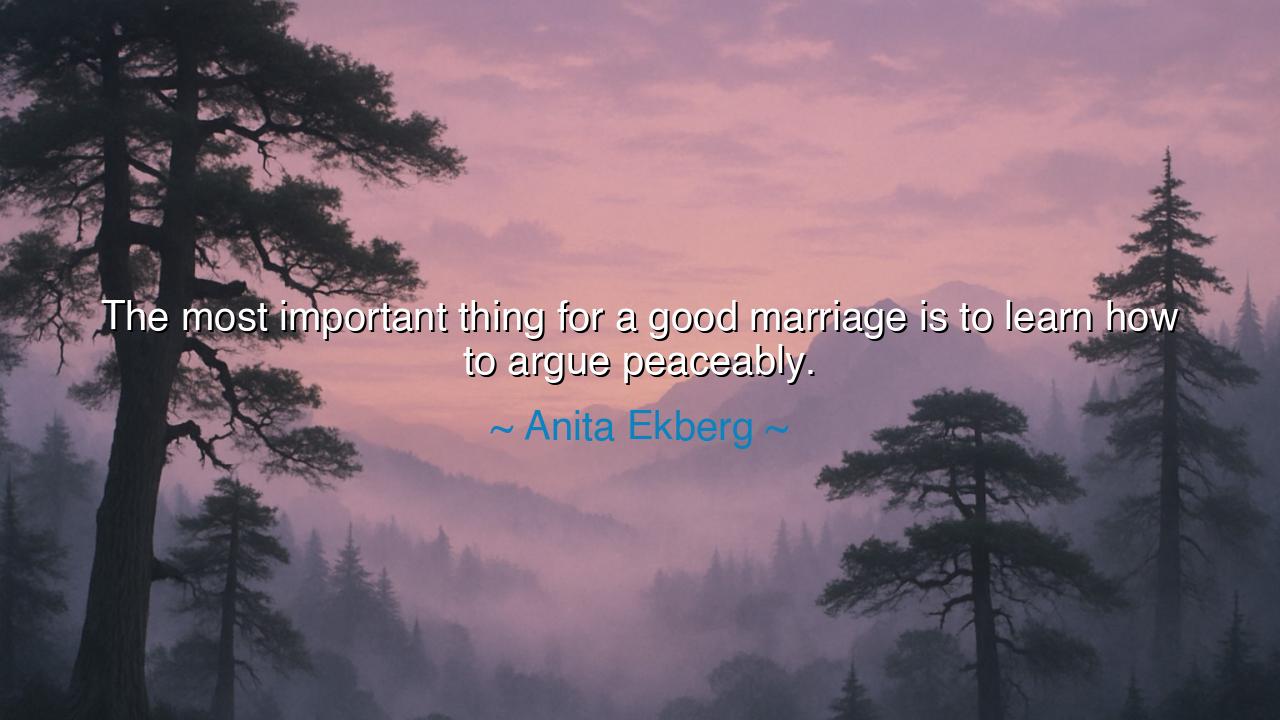
The most important thing for a good marriage is to learn how to






The words of Anita Ekberg, “The most important thing for a good marriage is to learn how to argue peaceably,” hold within them a wisdom both humble and profound. They speak of a truth that has echoed through the ages — that love is not proven in harmony alone, but in the storms it survives. To argue peaceably is to master one of the highest arts of human relationship: the art of conflict without destruction, of passion without cruelty, of truth spoken with care. For in every lasting union, there are moments of disagreement — but it is not the presence of conflict that determines failure, it is the way the fire is tended that decides whether it warms or consumes.
In the ancient world, the philosophers of Greece and Rome understood that the strength of a partnership lay not in the absence of discord, but in the ability to disagree with respect. They taught that even within the self, the soul is divided — between reason and emotion, between desire and duty — and only through balance can peace be achieved. So too in marriage: two souls, distinct in thought and feeling, must learn the sacred balance of discourse. Anita Ekberg’s words carry this eternal truth — that peace in love is not the silence of submission, but the harmony of two strong voices learning to sing together even when their notes differ.
To argue peaceably is to stand before your beloved not as an enemy, but as a mirror. The wise understand that in every argument, it is not victory that matters, but understanding. One who loves must learn to speak without wounding, to listen without pride, and to remember that the purpose of words is not to conquer, but to connect. When tempers flare, it is easy to forget that both hearts seek the same thing — to be heard, to be valued, to be safe. Thus, to argue well is an act of discipline and humility, the quiet courage of those who choose reconciliation over triumph.
Consider the union of John and Abigail Adams, whose letters across oceans and wars reveal the beauty of this principle. They disagreed often — on politics, on power, on the nature of duty — yet their words, even in conflict, were steeped in affection and respect. Their debates sharpened their intellects but never hardened their hearts. It was through their peaceable argument that they built a marriage of equality and endurance, each strengthening the other while preserving their individuality. Their love was not one of perfect agreement, but of enduring dialogue — proof that true companionship thrives not in quiet compliance, but in the courage to speak truth with gentleness.
Marriage, as the ancients taught, is both a union and a crucible. Within it, the ego must learn to bend, the heart to forgive, and the tongue to heal rather than harm. Those who fear conflict often bury their truth, and in doing so, breed resentment. Those who unleash it recklessly destroy the trust they seek to defend. Only those who learn the sacred middle way — to argue peaceably — preserve both honesty and love. It is not weakness to yield sometimes, nor shame to apologize first; it is the wisdom of one who values the bond more than the battle.
To argue with peace requires patience, the greatest of virtues. It demands that we pause before speaking, that we measure our tone as carefully as our words. The wise spouse asks not, “How can I win?” but “How can we understand each other better?” This kind of argument purifies rather than poisons; it reveals truth without violence, and through it, love deepens rather than erodes. For even the fiercest storm, if met with steadiness and grace, leaves the air clearer than before.
Let this, then, be the lesson carried forward: conflict is inevitable, but cruelty is a choice. Speak your truth, but let your voice carry love even in anger. Remember that in every disagreement lies an opportunity to know one another more deeply, to strengthen the bond that binds you. A good marriage is not a house without storms — it is one whose foundations are so strong that even the storm becomes a teacher.
Thus, Anita Ekberg’s words endure as a quiet commandment for all who love: Learn to argue peaceably. For love that cannot survive disagreement is fragile; but love that learns to speak gently even in discord is immortal. And when two souls can face conflict not as foes but as partners — seeking not victory but peace — they become as unshakable as the mountains, and as radiant as the dawn.






AAdministratorAdministrator
Welcome, honored guests. Please leave a comment, we will respond soon